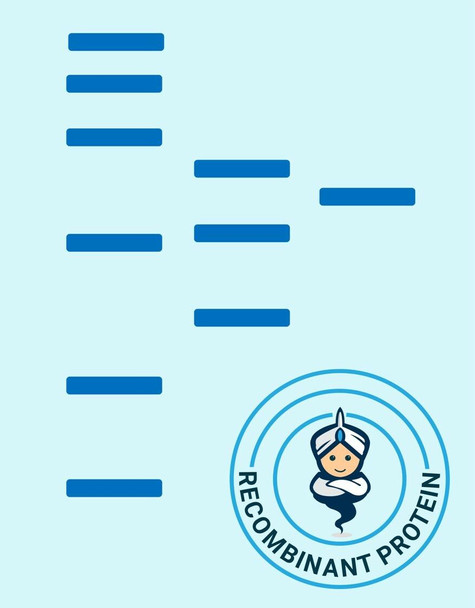Enzymes Recombinant Proteins
Human ACADSB Recombinant Protein (RPPB5769)
- SKU:
- RPPB5769
- Product Type:
- Recombinant Protein
- Species:
- Human
- Uniprot:
- P45954
- Research Area:
- Enzymes
Description
| Product Name: | Human ACADSB Recombinant Protein |
| Product Code: | RPPB5769 |
| Size: | 10µg |
| Species: | Human |
| Target: | ACADSB |
| Synonyms: | Short/branched chain specific acyl-CoA dehydrogenase mitochondrial, SBCAD, 2-methyl branched chain acyl-CoA dehydrogenase, 2-MEBCAD, 2-methylbutyryl-coenzyme A dehydrogenase, 2-methylbutyryl-CoA dehydrogenase, ACADSB, ACAD7, SBCAD, 2-MEBCAD. |
| Source: | Escherichia Coli |
| Physical Appearance: | Sterile Filtered clear solution. |
| Formulation: | The ACADSB solution (0.5mg/ml) contains 20mM Tris-HCl buffer (pH 8.0), 0.1M NaCl, 10% glycerol and 1mM DTT. |
| Stability: | Store at 4°C if entire vial will be used within 2-4 weeks. Store, frozen at -20°C for longer periods of time. For long term storage it is recommended to add a carrier protein (0.1% HSA or BSA).Avoid multiple freeze-thaw cycles. |
| Purity: | Greater than 90.0% as determined by SDS-PAGE. |
| Amino Acid Sequence: | MGSSHHHHHH SSGLVPRGSH MGSHMKSSQS EALLNITNNG IHFAPLQTFT DEEMMIKSSV KKFAQEQIAP LVSTMDENSK MEKSVIQGLF QQGLMGIEVD PEYGGTGASF LSTVLVIEEL AKVDASVAVF CEIQNTLINT LIRKHGTEEQ KATYLPQLTT EKVGSFCLSE AGAGSDSFAL KTRADKEGDY YVLNGSKMWI SSAEHAGLFL VMANVDPTIG YKGITSFLVD RDTPGLHIGK PENKLGLRAS STCPLTFENV KVPEANILGQ IGHGYKYAIG SLNEGRIGIA AQMLGLAQGC FDYTIPYIKE RIQFGKRLFD FQGLQHQVAH VATQLEAARL LTYNAARLLE AGKPFIKEAS MAKYYASEIA GQTTSKCIEW MGGVGYTKDY PVEKYFRDAK IGTIYEGASN IQLNTIAKHI DAEY |
Short/branched chain specific acyl-CoA dehydrogenase (ACADSB) belongs to the acyl-CoA dehydrogenase family of enzymes which catalyze the dehydrogenation of acyl-CoA derivatives in the metabolism of fatty acids or branch chained amino acids. ACADSB catalyzes the degradation of L-isoleucine while having the highest affinity for (s)-2-methylbutyryl-CoA, isobutyryl-CoA and 2-methylhexanoyl-CoA as substrates. ACADSB may use valproyl-CoA as substrate. ACADSB gene defects cause the short/branched-chain acyl-CoA dehydrogenase deficiency (SBCADD), which is an autosomal recessive disorder characterized by an increase of 2-methylbutyrylglycine and 2-methylbutyrylcarnitine in blood and urine.
ACADSB Human Recombinant produced in E.coli is a single, non-glycosylated polypeptide chain containing 424 amino acids (34-432) and having a molecular mass of 46.4kDa.ACADSB is fused to a 25 amino acid His-tag at N-terminus & purified by proprietary chromatographic techniques.
| UniProt Protein Function: | ACADSB: Has greatest activity toward short branched chain acyl- CoA derivative such as (s)-2-methylbutyryl-CoA, isobutyryl-CoA, and 2-methylhexanoyl-CoA as well as toward short straight chain acyl-CoAs such as butyryl-CoA and hexanoyl-CoA. Can use valproyl- CoA as substrate and may play a role in controlling the metabolic flux of valproic acid in the development of toxicity of this agent. Defects in ACADSB are the cause of short/branched-chain acyl-CoA dehydrogenase deficiency (SBCADD); also known as 2-methylbutyryl-CoA dehydrogenase deficiency or 2- methylbutyryl glycinuria. SBCADD is an autosomal recessive disorder and consists of a defect in catabolism of L-isoleucine which is characterized by an increase of 2-methylbutyrylglycine and 2-methylbutyrylcarnitine in blood and urine. Affected individuals have seizures and psychomotor delay as the main clinical features. Belongs to the acyl-CoA dehydrogenase family. |
| UniProt Protein Details: | Protein type:Oxidoreductase; Amino Acid Metabolism - valine, leucine and isoleucine degradation; EC 1.3.8.5; Lipid Metabolism - fatty acid; Mitochondrial Chromosomal Location of Human Ortholog: 10q26.13 Cellular Component: mitochondrion; mitochondrial matrix Molecular Function:acyl-CoA dehydrogenase activity; FAD binding Biological Process: branched chain family amino acid catabolic process; fatty acid metabolic process Disease: 2-methylbutyryl-coa Dehydrogenase Deficiency |
| NCBI Summary: | Short/branched chain acyl-CoA dehydrogenase(ACADSB) is a member of the acyl-CoA dehydrogenase family of enzymes that catalyze the dehydrogenation of acyl-CoA derivatives in the metabolism of fatty acids or branch chained amino acids. Substrate specificity is the primary characteristic used to define members of this gene family. The ACADSB gene product has the greatest activity towards the short branched chain acyl-CoA derivative, (S)-2-methylbutyryl-CoA, but also reacts significantly with other 2-methyl branched chain substrates and with short straight chain acyl-CoAs. The cDNA encodes for a mitochondrial precursor protein which is cleaved upon mitochondrial import and predicted to yield a mature peptide of approximately 43.7-KDa. [provided by RefSeq, Jul 2008] |
| UniProt Code: | P45954 |
| NCBI GenInfo Identifier: | 1168283 |
| NCBI Gene ID: | 36 |
| NCBI Accession: | P45954.1 |
| UniProt Related Accession: | P45954 |
| Molecular Weight: | |
| NCBI Full Name: | Short/branched chain specific acyl-CoA dehydrogenase, mitochondrial |
| NCBI Synonym Full Names: | acyl-CoA dehydrogenase short/branched chain |
| NCBI Official Symbol: | ACADSB�� |
| NCBI Official Synonym Symbols: | ACAD7; SBCAD; 2-MEBCAD�� |
| NCBI Protein Information: | short/branched chain specific acyl-CoA dehydrogenase, mitochondrial |
| UniProt Protein Name: | Short/branched chain specific acyl-CoA dehydrogenase, mitochondrial |
| UniProt Synonym Protein Names: | 2-methyl branched chain acyl-CoA dehydrogenase; 2-MEBCAD; 2-methylbutyryl-coenzyme A dehydrogenase; 2-methylbutyryl-CoA dehydrogenase |
| UniProt Gene Name: | ACADSB�� |
| UniProt Entry Name: | ACDSB_HUMAN |






